Eritrea, the recipe is cooperation
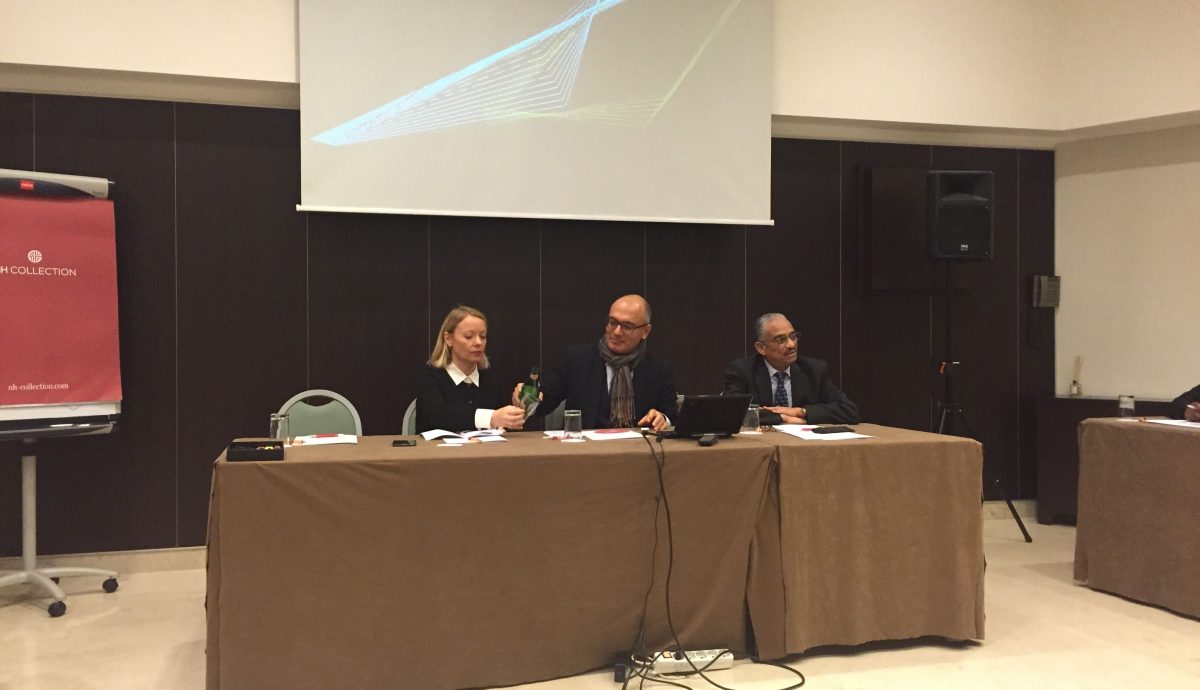
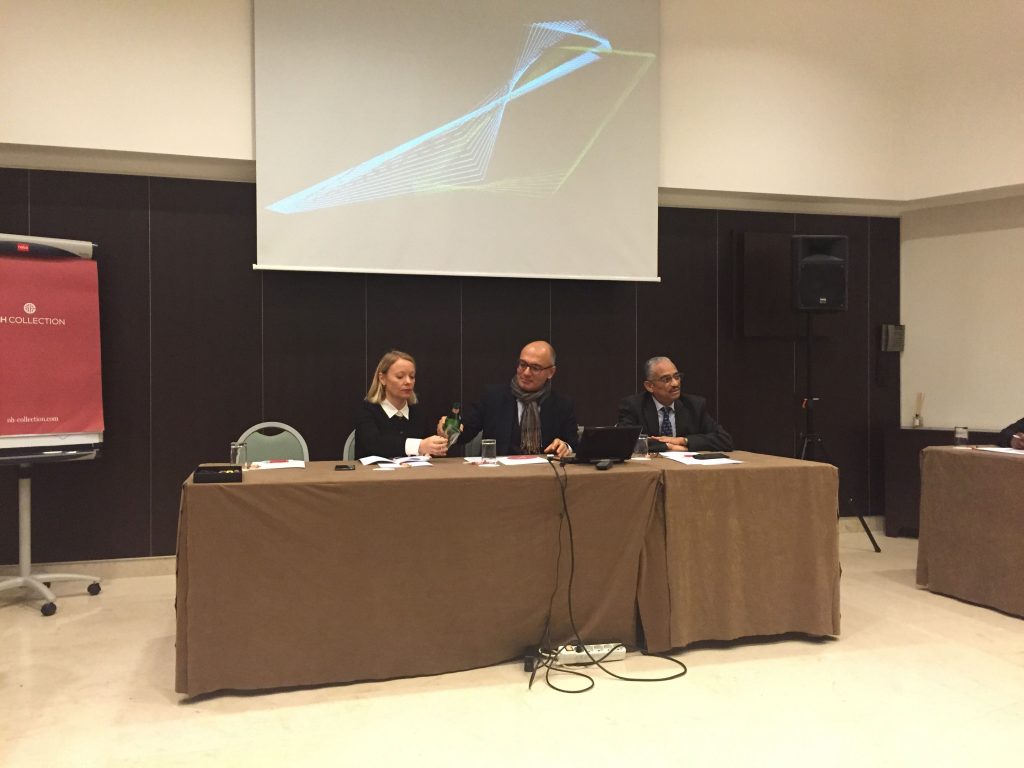
Rome, 11th November, “The recipe is cooperation” a meeting promoted by CEMO/Italy, moderator was Giovanni Cubeddu (centre), with Eritrean Ambassador in Italy Mr. Fesshazion Pietros and Ms. Suzanna Tkalec, humanitarian director of Caritas International
Mr. Fesshazion Pietros, Eritrean Ambassador in Italy and Suzanna Tkalec, humanitarian director of Caritas International discuss migration and development.
On Wednesday 11th November, in Rome, they talked about migration, without an “s”, as we are now accustomed to say and write, implying that it involves forced exodus, movements without a return. A topic that gets to front page news when the deaths at sea are many, or when Europe must decide who receives the migrants, who pays to rescue them, who can receive them, who can reject them, shutting their borders and shutting their eyes.
Where do migrants flee from and who are they?
They almost always flee from wars that, as in the case of Syria, make civilian life impossible, forcing families to go away. Eritreans, instead, leave a Country where there is no war, but where there is a critical situation for many various reasons, which are partly overlapping.
This was discussed with Fesshazion Pietros, Ambassador of the State of Eritrea in Italy, and Ms. Suzanna Tkalec, humanitarian director of Caritas International, during a meeting moderated by Mr. Giovanni Cubeddu and organized by CEMO, a foundation with main offices in Madrid and an operations branch in Rome, which has been active for over 25 years in the fields of cooperation and development.
The title of the debate was: “The recipe is cooperation. Immigration in Europe and development in the Horn of Africa”.
Ambassador Fesshazion retraced the recent history of his Country, because, as he said, “it is essential to know it in order to understand the reasons of the current migration”. “Eritrea” in fact, “is one of the youngest African Countries where, after a very long war (1961-1991), once independence was conquered, years of peace, stability and economic growth have followed, with a gdp of seven to eight per cent”.
Peace, however, was soon interrupted and in 1998 a new war broke out for an area on the Eritrean border claimed by Ethiopia. The conflict between the two Countries ended in 2000 with the Algiers peace Agreement, under the supervision of the United Nations Security Council, the European Union and the African Union, who would not be able to enforce it, though. “To this date” said the Ambassador, “Ethiopia occupies our territories, above all around the city of Badme”.
This situation is one of the instability factors. It is a drive to flee from a Country, which is not in peace, but which does not want war, obliged to have an army because “the Ethiopian army often makes incursions, without any provocation from Eritrean side. If Eritrea had reacted, we would have had other wars, which we are not interested to wage”, explained the Ambassador.
“The accusation against Eritrea” continued Mr. Fesshazion “is that young people escape from a military service lasting years. This is true. But if there is a threat from Ethiopia and we need a national defense, who should we entrust with it, if not young people? Past generations, who conquered independence, have already defended the Country”.
Another accusation against Eritrea, and the reason for the sanctions established in 2011 by the United Nations Security Council, is that Eritrea allegedly supports the Somali terrorist group of Al Shabab.
“Eritrea has done nothing against international law”, said the Ambassador, adding that his Country has spoken out several times on the necessity to resolve the Somali issue in political, not military terms.
The lack of a reason for the sanctions is also written in the report presented to the UN by the Somalia-Eritrea Monitoring Group (SEMG), stating that there is no evidence of Eritrean involvement with the Somali terror group of Al Shabab. However, said the Ambassador, even without a reason, sanctions do remain, a situation, which does not help the development of a peaceful, yet poor country.
But what is Eritrea doing for young people?
“Eritrea is a Country investing on young people” said the Ambassador, “in 1991, before independence, throughout Eritrea there were 471 schools attended by 220 thousand children and the only university was in Asmara. Today there are 1.540 schools for 860 thousand students (in 4 million inhabitants) and 7 colleges in the various county towns. Education is free for all at all levels, vaccinations are widespread everywhere. When Asmara was freed (1991) the incidence of AIDS was of 4.5%, now it is 0.9%. “We may be accused of being a dictatorship” concluded “but on our soil we are doing things that are not typical of a dictatorship”.
“Then, why is political asylum granted to young people fleeing our Country?” asked Mr. Fesshazion, adding that the report written by the Danish Immigration Service (DIS), after visiting Eritrea, talking to Western embassies, international NGOs and UN organizations states that “99.8% of Eritreans do not flee for political reasons, but for economic ones”. “Also an English delegation” continued the Ambassador “has written a positive report on the Country, while Norway, which receives many Eritreans giving them the status of political refugees, has realized that many of these come back to Eritrea for the holidays”. “Then”, concluded Mr. Fesshazion, “where is the political problem?”
Young Eritreans emigrate from poverty, they escape toward Western wealth, as he explained: “In Europe the average income per capita is 31 thousand euros, in Sub-Saharan Africa it is about 750 euros, in Eritrea 500 euros”. This is the reason why young people go abroad and, because they cannot do so legally, as they cannot get a normal visa from Western countries, they emigrate illegally, playing the now, sadly, well-known game of traffickers.
“The Eritrean Government knows these traffickers” said the Ambassador “and clearly said so during bilateral meetings, but the paradoxical result was that it was accused of trafficking”. “For this”, he continued “we have asked the United Nations Secretary General to form a commission, a group of independent experts to assess the situation and report on it”.
“There are no simple recipes for migrations, however, in our opinion, dialogue and cooperation” said the Ambassador “are the only way, but today there is a monologue instead of a dialogue”.
EritreaLive asked Ambassador Fesshazion how would Eritrea use the money for development, [referring to] the 200 million euros allocated to Eritrea by the European Union.
“The financing” replied the Ambassador “will be [spread] in five years and we will use it to have energy, which means promoting development, thus 90% will be for energy, as we are negotiating with the EU”.
In the same days a Summit between Europe and Africa was held in Malta on migration, reception, rules and security. At the end French President Françoise Hollande spoke harsh words against Eritrea, defining its governors as “unscrupulous leaders” and asking Europe to use “maximal political and diplomatic pressure” to tackle the problem of migration.
Speaking of religious tolerance, the Ambassador said that Eritrea enjoys a tranquil situation inside its territory; Christians and Muslims live in the same quarters, they meet up and participate in celebrations after the mutual religious ceremonies, while stressing that “it is no obvious result”. “In fact” he continued “in the years following independence, when Bin Laden was in Karthoum, in Sudan, an attempt was made to muslimize Eritrea, a Country, which was still in a phase of national reconstruction”. “But” he added “the attempt did not succeed, because we have a tradition of tolerance”.
“In fact” he continued “when the prophet Mohammed started preaching Islam, as he felt in danger, he decided to send fifteen converts, among which his daughter with her husband, to the other side of the Red Sea, to Massawa, where they could preach freely and where they built the first mosque in the world, which still exists”.
The meeting continued with the intervention of Ms. Suzanna Tkalec, humanitarian director of Caritas International, who spoke about Syria, the Country with the highest number of asylum seekers. “What is happening today in Syria, after four years and millions of refugees in neighbouring countries?” she asked. “Assistance” she continued “is guaranteed for a ratio of less than 50% than required, therefore families move. How? Through illegal, very well organized channels”. “In Syria” she explained “there are travel agencies providing a package, they even organize swimming lessons for those taking the Turkey-Lesbos route, to save themselves in case of a shipwreck. It is an expensive journey, approximately 1500 euros per person which, if multiplied by the 800 thousands arrivals make good business”.
The three largest groups of migrants are: Syrians, Afghans, Eritreans. While the first two groups are composed of families, Eritreans travel alone. But what are the scenarios in the near future? “We expect” explained Suzanna Tkalec “five to six thousand arrivals a day. The biggest problem, though, is represented by the closing of the borders. Germany will accept 1500 [migrants], then what? What will happen” she added “to those who are not granted asylum? What will happen to those who are sent back?”.
Would Eritrea taken them back?
“Not by force” replied the Ambassador “only if they decided to return voluntarily”. “As to the total number of Eritreans” he added “I would like to say that not all of those declaring to be Eritrean are truly so, many say they are Eritrean, because they know that, in this way they can be accepted quickly”.
In the past days the Austrian Ambassador in Addis Abeba, Mr. Andreas Melan said, in an interview to the APA (Austria Presse) that “40% of Eritrean migrants in Europe are Ethiopians”, as Eritrean cultural mediators have often stated.
But what responsibility does the Eritrean Government have towards the young people who leave?
“I believe” answered Ambassador Fesshazion “that we have failed to give young people employment and hope for the future, we have failed to make them understand the efforts we are making to re-launch the economy, in spite of external hostilities blocking reconstruction. Keeping young people along the border to protect the Country does not help our economy, it is not productive for the Country, but there is no choice. We are working to have full food security, infrastructures, better healthcare. People expect the Government to resolve problems and improve life, this is not happening, but it is only a question of time”.
Marilena Dolce
@EritreaLive
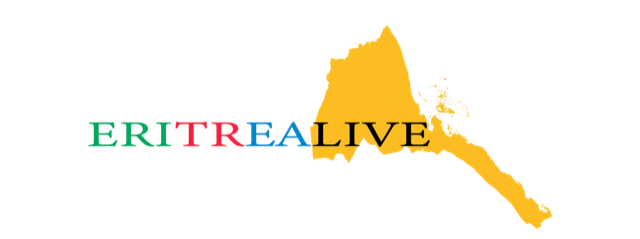
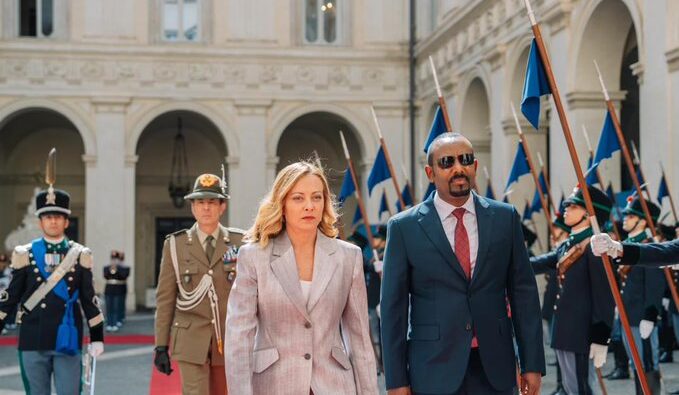
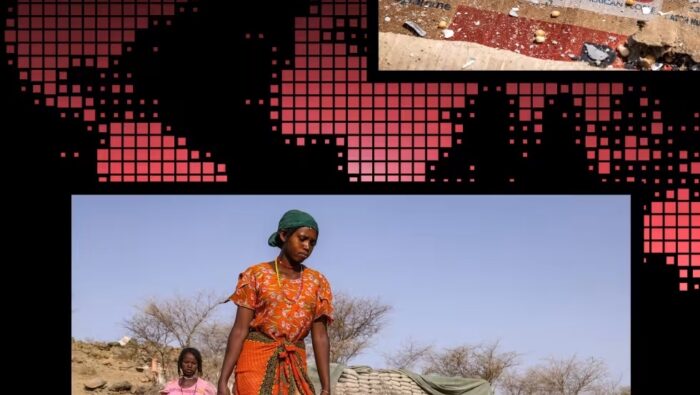
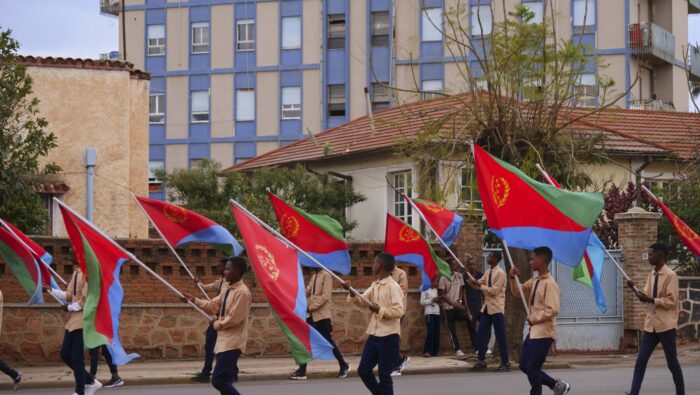
Lascia un commento